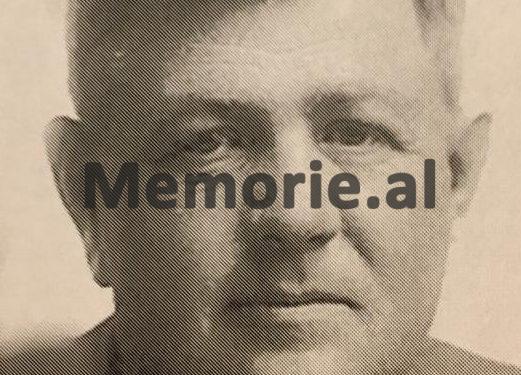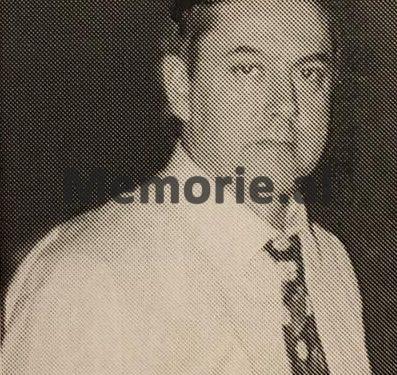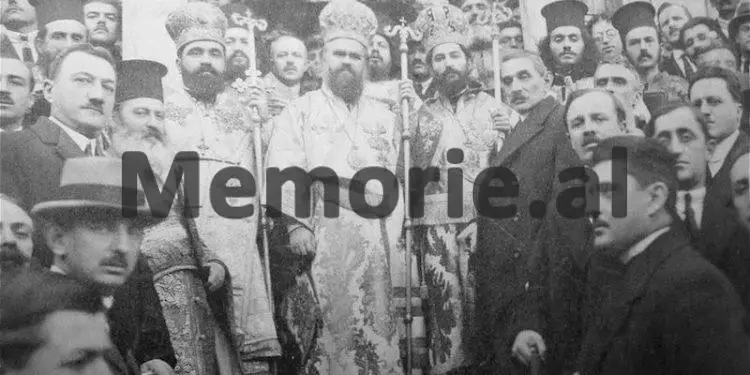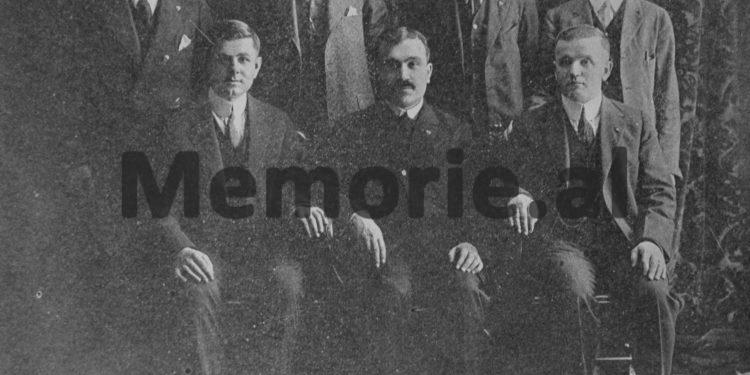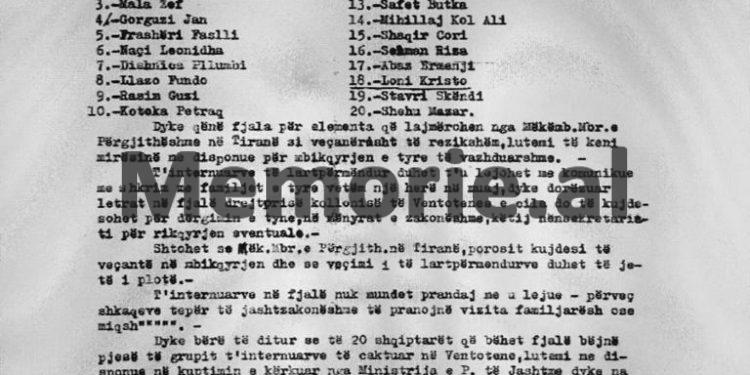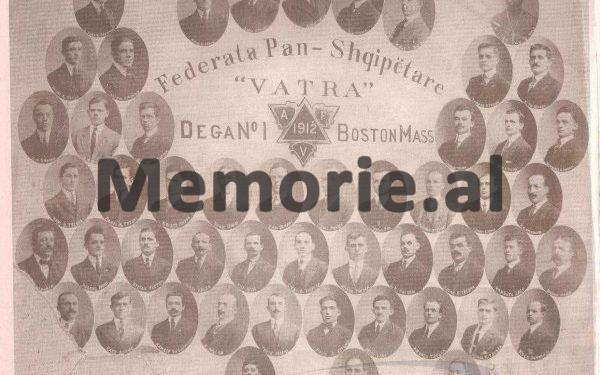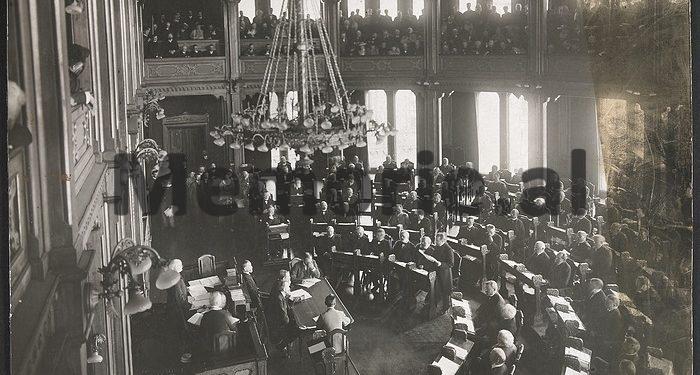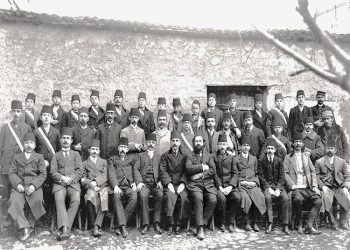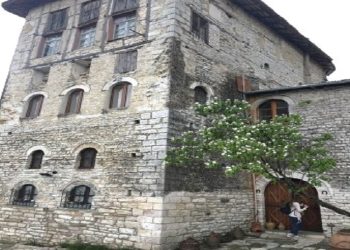Dashnor Kaloçi
Memorie.al publishes the unknown story of Loni Kristos from Hoçisht, Korça, who after being educated in Thessaloniki, emigrated to the USA and settled in a city near Boston where he connected with Fan Noli, Faik Konica, Qerim Panariti, etc. where the “Vatra” Society elected him general secretary and throughout the period of the First World War, with his writings in the newspaper “Dielli” he became an ardent defender of the Albanian cause against the intentions of the northern chauvinist circles. Lon’s graduation from Harvard and his return to Albania in 1920 with the music band of the Vatra Society, where he became involved in politics by being elected to the first Albanian parliament by the party led by Fan Noli, which he supported. with the newspaper “Bota e Re” where he was editor-in-chief. Loni’s departure from Albania after the fall of Fan Noli’s government and his return after the amnesty granted by President Ahmet Zogu in 1926 and his work as a teacher at the French High School in Korça until 1939 when he was interned by the Italians in Ventotene after opposing the fascist invasion of April 7, 39. His return home after his release from exile and his involvement in the Anti-Fascist Movement, where he was arrested again and held in the internment camp in Porto Romano until the end of the war and working as a translator with UNRRA, where due to her he was in danger of being arrested by the communists, as he did not accept the offer made by the communists for a high post in the government of Enver Hoxha. The testimony of his nephew, Dr. Arben Harito, for the correspondence he had with Noli and the abandonment that the current regime made to him because of the friendship he had with many of the top exhibitors of the National Front.
“On November 15, 1945, in a long letter sent by Fan Noli from the United States to Mrs. Simmons, who was working in Tirana on the UNRRA mission, she wrote to her that she was very happy that his old friend, Loni Kristo and his family came to life alive from the terrible world war, they are in good health in Tirana. At the same time, in that letter, he begged her to convey the news to Loni, that he himself was very well and that he expected his friend from Tirana to return an answer as soon as possible, informing him about his health and other friends. At the end of that letter, Noli wrote to Loni that Albania should be helped as much as possible. After that, Loni responded with a letter, which he sent on January 7, 1946, where, among other things, with great enthusiasm, he wrote to Noli about the fight he had waged against the invaders and in the construction. of the country. In that letter, he also wrote for a long time about their mutual friends, such as Father Vasil Marko, Koli Rrodhe, Loni Nini, Kristo Kirka, Koço Tashko, Kol Kuqali, etc. He also informed him about the deaths of other comrades such as Vangjel Turtulli, Nasi Aristidhi, and Peshkop Çamçen. After Noli received a letter from his friend from Tirana, he was overjoyed with his friends and ordered that it be published in the newspaper “Dielli”. Attached to that letter, Noli had sent his dissertation on Skanderbeg, where he wrote that he would soon come to Albania. The man who speaks and testifies for Memorie.al is 70-year-old Arben Harito, Doctor of Science, who from Toronto, Canada, where he has lived and worked for years, tells the whole story of his grandfather, Loni Kristos, one of the Albanian patriots. who founded the Vatra Society together with his close friend Fan Noli.
But who was Loni Kristo, what was the origin and past of his family? Why did he refuse to take on the high state duties offered to him by the communist regime? Why was Loni left without a job and accused of being a sympathizer of the National Front, escaping arrest for a while? All this is made known not only by the testimonies of Mr. Harito, but also through documents, photos, and other archival materials. After Loni’s death, they were saved by her daughter, Kathy Harito (Kristo), an old scientific collaborator and one of the founders of the Folklore Institute in Tirana. After her death in 1969, they were handed over to his son, Prof. Tony Christos, and then to Arben Haritos, who made them available exclusively to Memorie.al.
Who was Loni Kristo?
Loni Pandeli Kristo was born on August 21, 1880, in one of the oldest families in the village of Hoçisht in Devoll, which at that time was included by Bilisht, where their origin is from. He spent his childhood in his native village, where he also finished primary school, having as his teacher the great patriot Isaac Eskin, about whom Loni spoke with great admiration. When Loni was still a child, his father took the immigration route and left him alone, along with the rest of the family. After finishing primary school, Loni left Hoçisht and went to Greece to continue his education, but did not stay long there and returned to his hometown to attend classes in the city of Korça. But in 1905, he went to Thessaloniki and enrolled in the Franco-Greek Commercial High School, Nauca. There Loni learned Greek fluently and confronted the Hellenistic chauvinist circles, which at the time were extremely powerful. This added to his patriotic and patriotic feelings. After graduating from this school in Thessaloniki, Loni worked various jobs until he left for the United States.
With the Albanians of America
Regarding the placement of Loni Christos in the USA, his nephew, Dr. Arben Harito testifies: “Loni was initially housed in the town of Lynn, near Boston, where he set to work in a spectacle factory. In addition to his work there, Loni often visited the city library and followed with interest the news coming from his distant homeland Albania. He became extremely indignant when he heard the false news being spread by some newspapers about Albania. At that time, Loni began to make friends with some of the most famous patriotic and patriotic figures of the Albanian community of America, such as Fan Noli, Faik Konica, Qerim Panariti, Loni Katundi, etc. In 1912, while the two main leaders of the Albanians of America, Fan Noli, and Faik Konica, left for the London Conference, where they would defend the rights of Albania and the Albanians, the assembly of the Patriotic Patriotic Society “Vatra” elected him as Secretary-General. During the First World War, the Vatra Society kept alive and developed the patriotic feelings of Albanian Albanians in the United States, which is one of the most active societies in raising awareness and protecting the rights of Albania and Albanians around the world. She organized a series of rallies and sent dozens of letters to the Conference of Ambassadors in London and US President Woodrow Wilson. Throughout this intense activity, Loni Kristo, as Secretary-General, undoubtedly played a major role. Loni also conveyed his ideas in defense of the Albanian cause through publications in the newspaper “Dielli” of Vatra. In these writings, he strongly opposed the pro-Greek propaganda of the pan-Epirote associations led by Pantazis. For these contributions that Loni was making, he won the admiration of all Albanians in America, and especially that of Monsignor Fan Noli, with whom he would have a long friendship. At this time, he traveled throughout America, raising money that was necessary to keep this organization afloat. At the time, Loni’s stance was met at a meeting of the Italian consulate in Boston, where Consul De La Rosa offered financial assistance to the Dielli newspaper. But Loni, with a lot of care and culture, refused that help and received the greatest congratulations, not only from the leaders of Vatra but also from Fan Noli. And this is because, through a memorandum submitted to the American government, Vatra had strongly protested against the Italian protectorate over Albania “, remembers 70-year-old Dr. Arben Harito, regarding the patriotic activity of Loni Christos in the United States of America.
Graduation at Harvard
In addition to his duties as Secretary-General of the Patriotic Patriotic Society “Vatra”, which Loni Kristo carried out with great dedication, until 1920 when he stayed in the United States, where he also took care of his education. In this regard, Dr. Arben Harito testifies: “Since his arrival in the United States, Loni began his higher studies, enrolling at Harvard University, which he completed in 1919 when he was 33 years old. At a mature age, Loni decided to return to his hometown, thinking that at home he could help the national cause even more. At the time, he was fluent in several foreign languages, including English, Italian, Greek, and French, and was fluent in Turkish. After that decision, together with a large group of Albanians from the music band “Vatra”, among whom was Petro Ilia Tërpini, whom Loni had a close friend, in 1920, they took the long road and returned to Albania. Loni returned to his homeland with high hopes and plans, but time and life would reserve other surprises, often unpleasant. After 17 years, he returned to his native village of Hoçisht, from where he had left at a very young age. He immediately became involved in the country’s political life and was elected to the Albanian Parliament at the time, representing the Korça Prefecture, the Liberal Party led by his close friend Fan Stiljan Noli. Meanwhile, he started publishing the newspaper “Bota e Re”, which he directed as editor-in-chief, and with his articles published in that newspaper, as well as with speeches delivered in Parliament, Loni Kristo contributed to the consolidation of coming to power. of his party, led by Fan Noli. At that time, Loni had a great influence and popularity in the Korça region and especially in the Bilisht area, where he often went to meet with his constituents. He stayed for four years as a deputy of that prefecture, while in 1922, Loni married Miss Eftimia Sina (Kristo), an intellectual girl, from the well-known Seslar family of Leskovik, who was not only a devoted wife. , but he also became a reliable supporter during his lifetime. Fan Noli also took part in their wedding, which took place in his native village of Hoçishtë, which delighted not only the Kristo family but also the villagers of that area, who had the opportunity to meet one of them. the most famous men of the Albanian state ”.
Leaving Albania in 1924
In December 1924, with the overthrow of the government of Fan S. Noli and the return to power of Ahmet Zogu, Loni left Albania and settled in Greece as a political refugee. But he did not stay long in the neighboring country, and at that time he made perhaps the most important decision of his life, deciding to return to Albania. So in 1926, he returned to his homeland and, taking advantage of the amnesty granted at the time by Zog’s government, where, with the help of some of his friends, Loni was appointed English teacher at the French High School in Korça. At that school, he served uninterruptedly from 1925 to 1939, when Italy carried out the fascist aggression against Albania. In his memoirs about that time period, among other things, Loni wrote: “During the years 1925-1939, I was on the red list and under constant surveillance by the Zog government. There were constant reports against me. ” A year after Loni returned from Greece to Albania, he was summoned by the commander of the Bilisht Gendarmerie, Qemal Bokshi, who warned him that: reports were constantly coming to his address, calling him a fanatic and an opponent of the government. Gendarmerie Commander Bokshi advised Loni not to go out too much in public, and based on this warning, he began to devote more time to translations and the sport of hunting, which he practiced until the end of his life. “, Testifies Dr. Arben Harito, regarding the return of Loni Kristo to Albania in 1926. Also on the eve of his arrest, Loni Kristo was in the period of the Vlora Movement and the Fier Uprising in 1930 and 1935, where the Bilisht Gendarmerie had received orders that to monitor all his movements. But at that time, the deputy mayor of Vlora, Kosta Marko, saved him from arrest, whom Loni describes in his memoirs as a very honest man. Seeing that at that time Loni’s stay in Hoçisht was a problem and he was becoming impatient, he left from there and settled in the city of Korça. Although Loni never returned to his hometown, he continued to remember with respect and longing for that beautiful place and the home of his parents, which was one of the most beautiful and still there today at the entrance of the village. , says Dr. Arben Harito regarding the vicissitudes of his grandfather, Loni, during the years of the Zog Monarchy, as he was a Republican-convinced fan.
Internment in Ventotene, Italy
After April 7, 1939, when fascist Italy carried out the military aggression against Albania, Loni Kristo was completely engaged in the anti-fascist activity, making open propaganda against the attack on our country by the neighbors across the sea. Based on these activities, he caught the eye of the Italian fascist authorities who arrested him and together with some communists, anti-fascists, and other nationalists of that time such as Izet Bebeziqi, Zef Mala, Masar Shehu, Shefqet Musli, Selman Riza, Abaz Ermenji, etc., were interned on the islands of Ventotene in southern Italy. In a letter sent by the Royal Guard to the Directorate of the Colony of Political Prisoners on the island on March 29, 1940, Loni Kristo, along with 19 other people, was described as “dangerous.” In the Ventotene political exile camp, Loni stayed for a year and after his release, he came to Albania. Regarding his return to his homeland, Dr. Arben Harito testified: “After his release from exile and repatriation, Loni Kristo remained unemployed for two years and did not accept the offer made to him in 1942 to take a high position in the government of that time. After that, the family moved from Korça and came to Tirana. After settling in the capital, Loni came into contact with his comrades of the Anti-Fascist Movement with whom he had been interned in Ventotene. Being of nationalist conviction, Loni propagated Ethnic Albania and the unification of all political forums into a single front. But his anti-fascist activity again caught the eye of the Italian authorities, who arrested him for the second time and interned him in the Porto Romano camp in Durrës. Although he was in this camp, he never interrupted the correspondence with his anti-fascist friends and was released from there in November 1944, when the German occupying forces were withdrawing from Albania “, testifies Dr. Harito.
In 1945 translator of UNRRA
After the end of the war, Loni Kristo had no problem with the communist government of Enver Hoxha, who had just come to power, as his past as an exile in two Italian camps spoke in his favor, and that he could not be easily disturbed by them…But even though they did not disturb him, they did not have a good eye on Loni and did not offer him any post in the newly formed new government, although at that time there was a great need for such graduates outside the country. This was due to the fact that Loni Kristo had been friends with many of the exponents of Balli Kombëtar, some of whom had fled the country and were staying in Italian camps, while the rest had ended up with heavy sentences, political trials. But due to the economic need of his family, Loni was forced to start working privately, as an English translator on the UNRRA mission, where the Anglo-Americans supervised the distribution of aid to post-war Albania. During this period he also translated several great authors such as Wild, Longfellow, Omar Khajam, Hemingway, Defoe, etc., preparing for publication a good part of them.
Correspondence with Noli in 1946
In 1946, after a long hiatus, Loni Kristo resumed correspondence with his old friend, Fan Noli, who had lived in the United States for years. In one of these letters that Monsignor Noli sent to Christ on April 2, 1946, he wrote, among other things: “Dear Loni, your letter of January 17 fell into my hands almost two and a half months after you put it in the mail. I am the first to receive the post-war Albania stamp. I gave it to the Sun to publish. I learned of Agathangel’s death from the “Union” of Tirana, and last Sunday, March 31, we gave him a large memorial mass and a funeral prepared by the ladies of the Korça Society “Arsimi”. On this occasion, we also remembered Nasid Aristidhi and Vangjel Turtulli. I was glad that some of the friends came out alive from the Mondial mess. I spent my time studying here, as a young boy, and earned my doctorate. I sent the dissertation abstract. The books will be published here soon. With blessings to you and your family, I remain. Greetings F. S. Noli. I tried to bring this letter myself when I came there from the summer, but he, with a tail and a horn, advised me to send it to you by mail so that you would never receive it. ” As can be seen from the letter that Noli sent to his friend Loni Kristos, he expressed his desire to come to Albania, which he never did, for reasons that are still unclear. Prior to that, on November 15, 1945, Monsignor Noli had sent a lengthy letter to a US citizen named Simmons, who worked for UNRRA. Among other things, in that letter, Noli prayed to Mrs. Simmons to convey to Lon, the news that he himself is very well and expects him (Loni) to write to him as soon as possible and inform him about the other friends… At the end of that letter, Noli writes to Loni that Albania should be helped as much as possible. After that, Loni responded with a letter, which he sent on January 7, 1946, where, among other things, with great enthusiasm, he wrote to Noli about the war that the Albanian people had waged against the invaders. foreigners and for the construction of the country. In that letter, he wrote at length about their mutual friends, such as Father Vasil Marko, Koli Rrodhe, Loni Nini, Kristo Qirka, Goni Katundi, Koço Tashko, Andon Frashëri, Kol Kuqali, Sadik Duro, etc. He also informed him about the deaths of other comrades, such as Vangjel Turtulli, Nasi Aristidhi, and Peshkop Çamçen ”.
He is accused of being a Balli sympathizer
After working for some time as a translator at UNRRA, with her departure from Albania, Loni Kristo was again unemployed. In this regard, his nephew, Dr. Arben Harito testifies: “At the time, some of Lon’s friends who held important state and party positions proposed to him to make a post in the Albanian government at the time, but he flatly refused. But this would not be easily dispelled by the Communists, who apparently kept an “earring” on him, and after a few years, accused him of being a sympathizer of the Balli Kombëtar organization. After these accusations that threatened to arrest him, his pension was cut off, leaving him in a difficult economic situation. Although he went through a very difficult situation waiting from minute to minute for his arrest, he managed to escape without finishing in the Security cells, like many of his close friends. But after a few years, when he was 65, his terminated pension resumed. Although at that time he broke away from active life and locked himself inside his house, dealing with translations, he did not stop his favorite sport, hunting, where he went out with his old friend, Koço Tashko. In addition, he began helping his daughter, Kathy, in selecting Albanian folklore, as she worked at the Institute of Folklore. In 1960, Loni Kristo suffered a severe stroke that she could not cope with for a long time. This had to do with the death of his wife, Eftimia Sina, who passed away at the age of 60. At the same time, he was interned by one of the few remaining friends, Koço Tashko, who was expelled from all party and state functions he held at the time and was sent with his family into exile in a village in Fier. In the last days of his life, in a letter he sent to his old friend, Monsignor Fan Noli, dated November 3, 1960, he wrote, among other things, about the loss of his wife and his illness. Almost all of Lon’s letter is written in gloomy and pessimistic notes, expressing no regrets about whether he will soon be reunited with his wife in the next world. But he also lacks the pride he feels for what he has done for Albania and the contribution he has made throughout his life in the service of the homeland. That letter sent to Monsignor Fan Noli, who is dated November 3, 1960, writes, among other things, about the loss of his wife and his illness. Almost all of Lon’s letter is written in gloomy and pessimistic notes, expressing no regrets about whether he will soon be reunited with his wife in the next world. But he also lacks the pride he feels for what he has done for Albania and the contribution he has made throughout his life in the service of the homeland. That letter sent to Monsignor Fan Noli was the last one for Loni Kriston because, in January 1961, he died of a serious illness and was sent to rest in the Tirana cemetery, ”concludes his confession. Arben Harito, for his grandfather, Loni Kriston, one of the Albanian patriots who devoted his whole life to the cause of the homeland and who was forgotten by the communist regime of Enver Hoxha./Memorie.al




